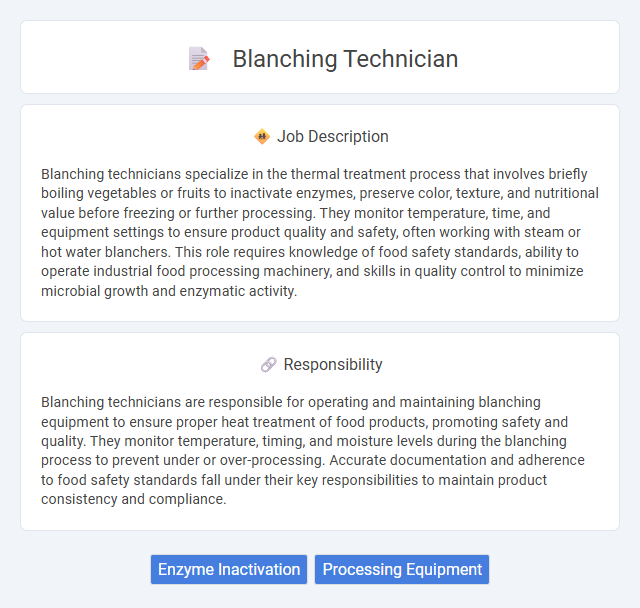
Blanching technicians specialize in the thermal treatment process that involves briefly boiling vegetables or fruits to inactivate enzymes, preserve color, texture, and nutritional value before freezing or further processing. They monitor temperature, time, and equipment settings to ensure product quality and safety, often working with steam or hot water blanchers. This role requires knowledge of food safety standards, ability to operate industrial food processing machinery, and skills in quality control to minimize microbial growth and enzymatic activity.
Individuals with a strong tolerance for heat and the ability to stand for extended periods may be suitable for a blanching technician role, as the job often involves working near high-temperature equipment. Those with good attention to detail and manual dexterity could likely perform well in this position, which requires precise handling of food products. People prone to respiratory issues or heat sensitivity might find the working conditions challenging and could be less suited for this job.
Qualification
A blanching technician typically requires a high school diploma or equivalent, with specialized training in food processing or a related field preferred. Proficiency in operating blanching equipment, understanding safety protocols, and knowledge of food quality standards are essential qualifications. Experience in a food manufacturing environment and the ability to perform routine maintenance and inspections enhance job performance and career advancement.
Responsibility
Blanching technicians are responsible for operating and maintaining blanching equipment to ensure proper heat treatment of food products, promoting safety and quality. They monitor temperature, timing, and moisture levels during the blanching process to prevent under or over-processing. Accurate documentation and adherence to food safety standards fall under their key responsibilities to maintain product consistency and compliance.
Benefit
Blanching technicians likely experience improved job security due to the essential role they play in food processing industries, especially in vegetables and fruits preparation. They may benefit from the development of specialized skills that increase their employability in related sectors such as quality control and food safety. Working in this position could also offer consistent work hours and opportunities for advancement within manufacturing or production environments.
Challenge
Blanching technicians likely face challenges in maintaining precise temperature and timing controls to ensure optimal product quality and safety. Variability in raw material properties may increase the complexity of achieving consistent results. Adapting to evolving food safety regulations could also require continuous skill development and process adjustments.
Career Advancement
Blanching technicians play a crucial role in food processing by using precise temperature control to prepare vegetables and fruits for freezing or canning, ensuring product quality and safety. Expertise in blanching techniques opens pathways to supervisory or quality control positions within food manufacturing facilities, emphasizing process optimization and compliance with food safety standards. Advancing in this field often involves gaining certifications in food safety, equipment maintenance, and process management, which enhance career prospects in plant management or technical specialist roles.
Key Terms
Enzyme Inactivation
A blanching technician is responsible for controlling the heating process to achieve precise enzyme inactivation, which prevents spoilage and preserves the quality of fruits and vegetables. By monitoring temperature and time parameters, they ensure that enzymes like polyphenol oxidase and peroxidase are effectively deactivated to maintain product color, texture, and nutritional value. Expertise in blanching equipment and process optimization is essential to minimize nutrient loss while achieving microbial safety and extended shelf life.
Processing Equipment
Blanching technicians specialize in operating and maintaining processing equipment crucial for the thermal treatment of food products to preserve quality and extend shelf life. Their expertise includes managing blanchers, conveyors, and automated control systems to ensure precise temperature and timing parameters are maintained during the blanching process. Proficiency in troubleshooting equipment malfunctions and optimizing processing flows enhances production efficiency and product consistency in food manufacturing.
 kuljobs.com
kuljobs.com